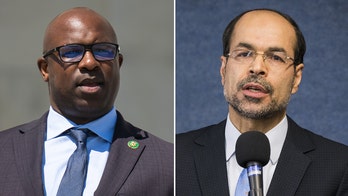
Protestors wave American, Mexican and Guatemalan flags as thousands march at an immigration rally in Homestead, Fla. as part of a planned national day of economic protests, boycotting work, school and shopping to show the importance on immigrants to the country Monday, May 1, 2006. (AP Photo/Lynne Sladky)
They're calling the proposals they plan to consider in their new legislative session "immigration light."
They say these bills, aimed at cracking down on illegal immigration, will not be mirrors of those in Arizona, which made headlines last year with its controversial immigration laws.
But while the Florida bills will be a watered-down version of Arizona's measures, they still will be tough, say lawmakers, and will aim to send Washington D.C. a message to do something about illegal immigration.
"Nothing out of Florida is going to resemble Arizona," said Florida Senate President Pro Tem Mike Bennett, R-Bradenton, to The Associated Press. "A lot of it is to get the federal government to take notice and take action."
Immigrant rights groups say the state should be passing bills that are good for Florida, not to make political statements. They remain worried some of the proposals could lead to racial profiling.
Meanwhile, some law enforcement agencies say the measures could create unfunded burdens on them, while business groups say it may scare off foreign investment, immigrant entrepreneurs and tourism.
The bills will be considered during the upcoming 60-day legislative session, which begins March 8.
Bennett's initial bill, a placeholder filed last fall to accompany one filed by State Rep. William Snyder, R-Stuart, did resemble the Arizona law.
That bill made it a misdemeanor not to carry proof of citizenship or valid immigration papers but made no mention of tourist or temporary work visas, both of which are far more common in Florida than Arizona.
Bennett said he didn't read the bill before putting his name on it. He has since filed another that focuses on early release and deportation of immigrants convicted of certain crimes.
Other bills being considered in the House and Senate would require local law enforcement to check the immigration status of anyone they arrest; require all Florida employers to use the federal work eligibility database known as E-verify; and allow private citizens to sue local law enforcement agencies for failing to enforce state immigration laws.
Another provision would require local law enforcement to be trained in immigration enforcement, but only if the federal government provides funding.
Bennett predicted similar legislation will be passed in more than a dozen states around the country this year and has been in contact with counterparts in Arkansas, Missouri, California and Texas, though in states like Arkansas and California, the chances for such proposals are looking dim.
Another bill, unlikely to gain much traction this year, would allow undocumented immigrant students living in Florida to pay in-state tuition to the University of Florida College System.
State Sen. Anitere Flores, R-Westchester and chairwoman of the Judiciary Committee, says the majority of her colleagues now agree "the Florida bill will not be as far reaching as the Arizona bill."
She seconded Bennett's notion that the final legislation should "send a strong message to the federal government," without hurting Florida's tourism industry.
A revised Senate bill is expected Friday. Snyder's office did not have a date for a revised House version.
María Rodríguez, executive director of the Florida Immigrant Coalition, said she is relieved lawmakers are backing off the Arizona-style proposals. But she said even the latest bills "divert time and energy from what really ails us. These are not going to get us more jobs. They're not going to cut down on foreclosures."
She is also concerned that some of the initial provisions from the Arizona bill will make their way into the final version.
Bennett says the problems related to the influx of illegal immigration in the state must be addressed. He connected the rise of gang activity in Manatee County to the influx of undocumented immigrants. He said the state is housing an estimated 5,600 undocumented immigrants in its jails and prisons, about 5 percent of the inmate population.
Last year, the Department of Justice authorized $13.8 million for Florida to cover the cost of housing undocumented immigrant inmates. Manatee County was among the 10 counties receiving the largest amount.
The Florida Chamber of Commerce, which has expressed concern about the proposals, says that while incarceration of immigrants costs Florida more than $90 million a year even with the federal aid, immigrants contribute an average 50 times that in state taxes.
The chamber has urged lawmakers to work with the federal government on the issue.
In Martin County, which has seen a significant rise in immigrants in recent decades, Sheriff Robert Crowder said his deputies regularly check the immigration status of those arrested.
"But if they start requiring us to do things we can't do because of manpower, that's a problem," he said, referring to the cost of having to drop inmates off at federal immigration facilities, more than a two-hour drive from his county.
Crowder also fears that if federal immigration violations become state crimes, Florida will lose the federal funds that help cover immigrant inmates. And he is concerned about frivolous lawsuits against his agency.
"If we don't just go out there and get people who look Mexican and bring them in for checking, the radicals accuse us of being sanctuary cities," he said.
Bennett say he recognizes the issue is more complicated than he first thought.
For example, he says, "I did not think about the number of people who are serving in our military who are not citizens of our country, who are out there fighting for our family, to protect our country," some of whom also have relatives facing deportation.
"The whole immigration problem is truly a heart-wrenching problem because a lot of those people who came here illegally were doing the exact same thing I would do if I would have to feed my family," he said. "But it's still against the law."
This is based on a story by The Associated Press.
Follow us on twitter.com/foxnewslatino
Like us at facebook.com/foxnewslatino




